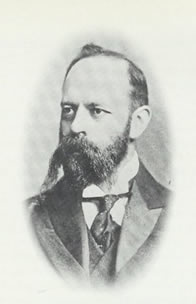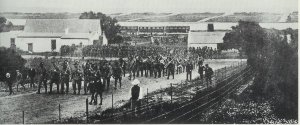|
||
|
Chapter 11 - The First World War and After
In the light of after events there was a grim significance when, on May 26, 1913, the Department of Defence, then only a few months old, saw fit, through the Secretary for Lands, to claim from Milnerton Estates a tract of ground for military purposes. With the amount of £1 000, tendered by the Government, considered grossly inadequate, preparations were made for possible expropriation proceedings, the service of the famous advocates, Beauclerk Upington and Sir Henry Juta being retained to act for the Company. Meanwhile data was accumulated "as to the value of the property and the extent to which the same would probably be affected by the erection of a Battery of artillery on the estate. . .”.
Less than a year later, with the outbreak of the First World War, the true meaning became clear of the steps taken by the Government. Already on March 17, 1914, there was a letter from the Army "requesting permission to offload material for the Fortification work, at the railway siding near the bridge". Despite arbitration proceedings already in progress, a block of 60 plots and sections of road were taken over. Hostilities had been in progress for some months, when, on January 6, 1915, concession fares (single fare for the double journey) were granted to members of the Defence Force stationed at Milnerton.
Political influence available to the management of Milnerton received a fresh boost through the election as Chairman of Sir David Graaff, father of Sir De Villiers, and one of the most important personalities in public life at the Cape. Beside being a close neighbour, on his famous farm De Grendel, Sir David was Chairman of the Imperial Cold Storage & Supply Company Limited, and a member of the Union Cabinet, first as Minister of Public Works, then as Minister without Portfolio, and later as Minister of Finance and of Posts and Telegraphs.
More and more soldiers were now stationed around Milnerton, some for training purposes and some as garrison troops, besides many who made voluntary use of its amenities. Hence a fresh enquiry from the Army, as to whether members of the Regular Forces stationed at Milnerton "would be allowed to travel Second Class on our line with Third Class warrants, when on duty". Although the Company had no objection, the S.A.R., rather surprisingly, refused to agree and so the matter was left to be fought out between the two rival Departments of State.
One sign of the times was a Race Meeting held at the Milnerton Turf Club in October 1914 in aid of Red Cross Funds, setting a precedent repeated several times during the War.
Notwithstanding the upheaval a certain amount of development continued. In 1916 ownership of the Cambridge Hotel passed to F. W. Glover, while there were two new dairy proprietors, G. Cloete and G. Griffiths, also J. Pentz, blacksmith, and J. Succa, "crayfish factory".
Above all there was a very important new public institution - a Public School - "Miss Prowse, Principal", her post being taken in 1917 by W. Miller J.P. So too we find, after a lapse of years, the familiar name of Charles Greig back in Mi1nerton. No longer a general dealer, he was now representative of the New Zealand Insurance Company Limited, a post he continued to hold till 1921.
Of permanent importance were the economic effects arising from South Africa's need to industrialise in compensation for the loss of overseas communications through enemy U-boat action. This meant that Paarden Island rapidly developed into a factory area, separated from Milnerton proper. Nonetheless the abnormal times did not prevent an "Electric Light Agreement" being signed, under which a power line was also run from Cape Town to the residential areas, collection of accounts being left to the Company. As for the Railway, enquiries were carried out by Mr. McEwan, a senior official of the S.A.R., about "Motor Carriages", employed in England by the Great Western Company and recommended for use on the line to Milnerton. "The proposal is not one which I would recommend," was Mr. Evans' verdict.
Higher working costs made increases in fares inevitable. Despite concessions" for soldiers and schoolchildren, ordinary tickets went up substantially in 1917. Although few residents had cars of their own, for the first time the Milnerton Estates joined the Cape Provincial Administration in helping to finance the construction of a main road, the Marine Drive, to which the modest amount of £250 was contributed, plus 3000 cubic yards of local gravel.
Discussions also began in 1917 with the Surveyor-General, on a matter destined to hang fire for 60 years. This was the opening up of the riverside section of Rietvlei.
Much to the satisfaction of the Milnerton Estates, the Milnerton Turf Club, having now completed the term of its initial lease, asked a renewal for another 10 years, as from 1917, the first of many to follow. In return the Club not only encouraged improvements, but gave a useful £8 000 in cash. As Messrs. Louwrens & Stephen put it: "The expenditure of so large a sum will be the best guarantee of the Turf Club's goodwill towards the Estates".
Scared by reports of contaminated water in 1917, the Company sought the advice of the eminent chemist and bacteriologist, Dr. Rudolph Marloth. "Having inspected the site of the borehole near the Race Course on Friday," he said, "I regret I cannot afford you any definite explanation for the occurrence of the impurities found in the water which I analysed . . ." Beyond identifying "organic matter of animal origin", the doctor was baffled in tracing where it came from. "As at present no stable or kraal exists near the site of the borehole, the polluted water must either come from a great distance or be due to an old deposit of animal matter at the very site of the borehole . . ." Marloth recommended digging a shaft, after which the trouble seems to have cured itself without ever having been properly explained.
Although, to the immeasurable relief of Mankind, the First World War drew to a close, it was not without the occurrence of another major ordeal, the pandemic "Spanish Influenza". In the closing months of 1918 this carried off more of Cape Town's population and that of its suburbs than had the recent conflict. Nor did Milnerton fail to suffer. As the Troops came home and the community strove to adjust to a new economic situation, dominated by the higher cost of living, there was social unrest, to which indirect reference was made on August 18, 1918. Mr. Salmon of the Milnerton Railway informed the Company: "With regard to the over crowding of the trains from Woodstock during the recent Tramway Strike, I will endeavour to prevent this happening again, but you must remember that the Company does not pay for the trains from Woodstock and is not entitled to any portion of the revenue from that service. . .". For the first time too there was talk of a sensational novelty on April 9, 1920, when the South African Railways received a request from the Company. "In connection with electrifying the other Suburban Line you should take into serious consideration the advisability of electrifying the one to Milnerton." Economic factors, however, intervened, however successful the new service promised to be on the Simonstown and Bellville routes. Yet the personal influence of Graaff created a useful contact with another department. "The Government," said Sir David on June 25, 1920, "is granting £500 000 at four per cent for building purposes and I suggest we apply for £100 000 thereof to spend on erecting buildings on the estate." This was duly approved, and the firm's attorneys duly notified the authorities.
Even now, in 1920, there was still no Post Office, a fact recorded in "Donaldson's Directory" in a fresh account. "The New Marine Drive from the foot of Adderley Street, Cape Town, passes right through Milnerton. It has water and electric light from the Cape Town Municipality. It has excellent surf bathing, and also still-water bathing in the Diep River estuary. The residential portion lies outside the Municipality of Greater Cape Town. There is no Post Office, but a daily delivery from Maitland, via which office all letters should be addressed." No reference was made to the continued existence of the Call Box, but there was mention of a new school principal, Mrs. M. E. Skinner.
One glimpse of the future was furnished by implication on March 21, 1921, when it was laconically noted: "The proposal of Aviation Limited to take photographs of the property of the estates was not entertained". Neither, incidentally, was a governmental project for the creation of a Convict Station. This was duly installed on the site of "King George Fort" and proved to be a useful amenity since its inmates were not only available for the construction and maintenance of roads and other public works, including the wall along the East side of the Diep River, but small gangs could be hired by private citizens at one shilling (10 cents) per head per day.
|
||
|
|
||


